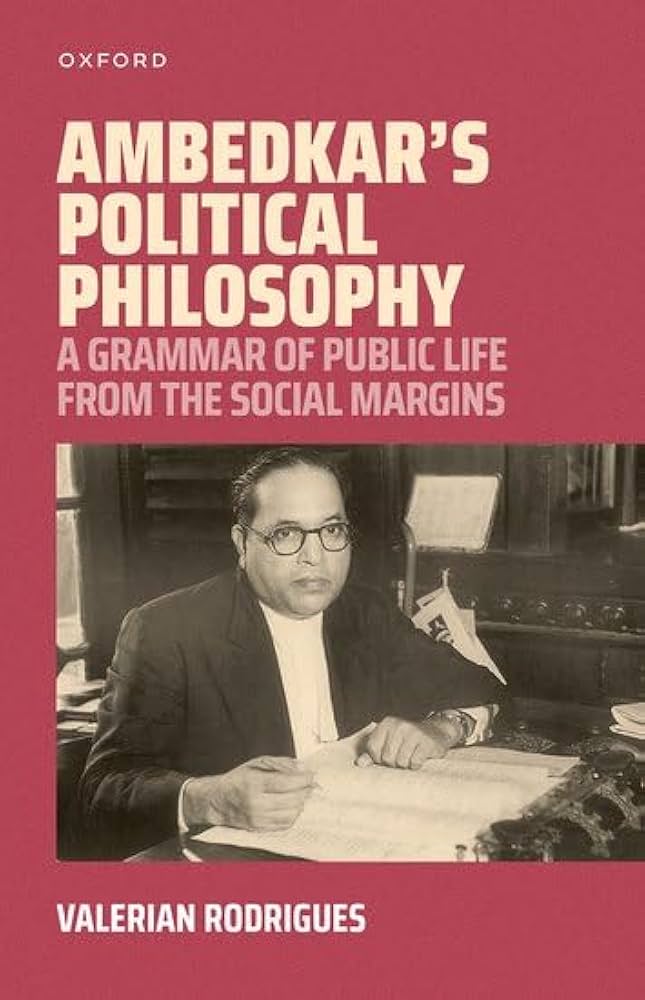Book Talks@NLS Library | Ambedkar’s Political Philosophy: A Grammar of Public Life from the Social Margins
Basement, NLSIU Library
Registration is mandatory for the public. To register, click here.
Wednesday, November 13, 2024, 5:00 pm
Open to the public.
 The NLSIU Library Committee is organising a book talk at the NLS Library by Valerian Rodrigues on his book ‘Ambedkar’s Political Philosophy: A Grammar of Public Life from the Social Margins.’ The talk will take place from 5 pm to 6:30 pm. This is the first public discussion of Prof. Valerian’s book.
The NLSIU Library Committee is organising a book talk at the NLS Library by Valerian Rodrigues on his book ‘Ambedkar’s Political Philosophy: A Grammar of Public Life from the Social Margins.’ The talk will take place from 5 pm to 6:30 pm. This is the first public discussion of Prof. Valerian’s book.
Panelists:
Valerian Rodrigues, Former Professor, Centre for Political Studies, JNU (Author of the book)
Shruti Kapila, Professor of History and Politics, University of Cambridge, and Visiting Professor, NLSIU
Arvind Narrain, President, PUCL, Karnataka
Moderator: Chandrabhan Pratap Yadav, Assistant Professor, Social Science, NLSIU
This event is open to the public and registration for members outside of the NLSIU community is mandatory to attend the event. To register, click here.
About the book
This study is organized around a set of key concepts that Ambedkar, the Indian thinker and leader of the socially marginalized, proposed to reconstruct public life, factoring in oppression and degradation. This framework conceived human beings as endowed with a distinct set of attributes entitling them to consideration as moral equals despite other differences among them. It also accorded a procedural priority to consciousness in human understanding. Ambedkar deployed this framework to contend against social institutions of caste, untouchability, and other forms of marginalities and to interrogate texts, traditions, and modes of social dominance. Ambedkar regards justice as foundational to modern societies. It called for ‘initial equality’ across its members while recognizing desert. All differential accomplishments, however, cannot be rewarded or compensated. Democracy is an essential requirement to resolve competing claims. As a self-governing mode of rule, democracy affords access to its members to multiple avenues of reach, learning, and enablement. Nationalism, a distinctive bond that precipitates with the entry of the masses into the political arena, is justiciable only if it has a definitive tilt towards democracy. Social relations, however, are caught in trappings of power across levels of a social ensemble. Control over state power is an indispensable condition to undermine dominance and enable the commons. The representational, constitutional, and institutional architecture of power must be geared to this end. Such a pursuit needs to be secured through an apt moral anchor shored up through religious sanctions. In Ambedkar’s view only Buddhism can measure up to this demand.
(Source: Oxford University Press)
About the author
Valerian Rodrigues is currently a Jawaharlal Nehru University Fellow, Nehru Memorial Trust, New Delhi, and former Professor, Centre for Political Studies, Jawaharlal Nehru University. He has taught at Mangalore University, Karnataka (1982-2003) and Jawaharlal Nehru University (2003-2015). Rodrigues has been National Fellow of the Indian Council of Social Science Research (ICSSR) (2015-17) and Ambedkar Chair, Ambedkar University, Delhi (2017-2018). He has also been Visiting Scholar and Professor at Erfurt University (2012), Wuerzburg University (2011, 2015), and Simon Fraser University (2019), and Fellow of St. Antony’s College, Oxford University (1989-1991), Indian Institute of Advanced Study, Shimla (1999-2001), and Max Weber College, Erfurt (2012).
(Source: Oxford University Press)
Excerpts from the talk
On ‘frames’ of thinking
“A thinker has a kind of substratum on which he builds up his positions. What is that substratum? People have called it different things. You could call it ‘epistemic,’ you can call it ‘frame’. Say for example, Professor Amartya Sen calls it a ‘frame’. You can call it whatever term that you use. I was interested, what is the frame of thinking that this man [Ambedkar] employs to take up the kind of stances that he takes? And that remains invariant over the changes.”
The Ambedkar-John Dewey connection
“How does he [Ambedkar] go about thinking? … Recently there have been a lot of people who have been writing the connection between the American philosopher, John Dewey, and Babasaheb Ambedkar and some of them even have reduced Ambedkar into a footnote of John Dewey. I thought that these are claims that are not warranted.”
‘Being’ vs ‘Consciousness’
“Ambedkar thinks that ‘consciousness’ is primary for understanding and rejects the central Marxist thesis of primacy of ‘being’ over ‘consciousness.’ Ambedkar just reverses it and begins to say ‘consciousness’ is before and ‘being’ is defined by ‘consciousness.’ But this is not a two way process, but deeply interactive processes wherein consciousness undergoes changes but the nature of being also undergoes changes because you don’t merely think but you also act.”
Ambedkar’s idea of the ‘human’
“I think the idea of the ‘human’ is quite central to Ambedkar and, Ambedkar begins to begin to dwell extensively on that. The concept of ‘rights’ are dependent upon the idea of the ‘human’ and Ambedkar comes very strongly to argue the concept of ‘human dignity,’ that there is a unique dignity that people have and that dignity goes into making them as equal … The idea of ‘conscience’ is also quite central to Ambedkar and he also critiqued the tradition by invoking this idea. Ambedkar rejects the idea of ‘God’ and man and I hope, you know, an argument which he makes in ‘The Buddha and His Dhamma,’ I put it there in the idea of the human because he thinks eventually humans have to take charge of their own lives. They have to take charge, they have to be responsible and the idea of ‘God’ and the idea of the ‘soul,’ etc., do not allow human beings to take charge of themselves.”

